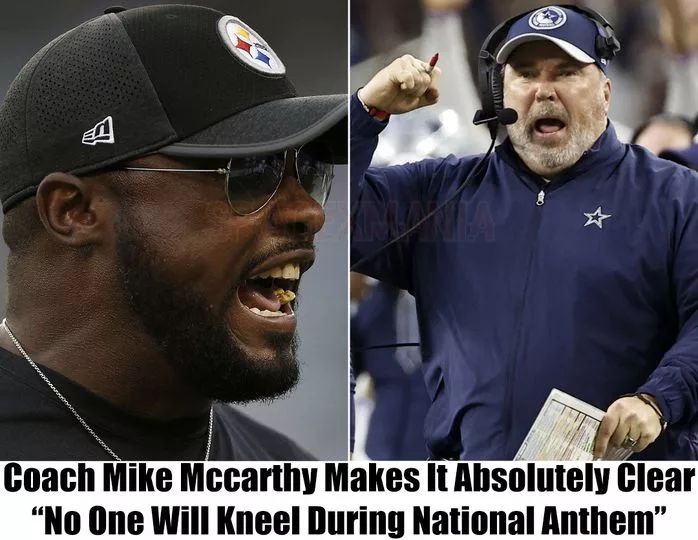The ripple effects of Mike Tomlin’s controversial decision to ban anthem kneeling continue to traverse the vast expanse of the NFL. The latest coach to draw a line in the sand is none other than Mike McCarthy, leading the helm for the Dallas Cowboys. McCarthy’s recent proclamation that he too will not tolerate kneeling during the national anthem has further amplified the discourse surrounding player expression, patriotism, and the role of sports in social activism.
From its inception, the act of kneeling during the anthem was loaded with symbolism and intent. Initially championed by Colin Kaepernick as a peaceful protest against racial inequality and police brutality, the gesture quickly became emblematic of the struggle for justice, equality, and the freedom of expression within the NFL.
McCarthy’s recent announcement places him squarely in the camp of those who believe that the football field should remain a space distinct from political and societal protest, a stance that resonates with many but also irks a significant portion of both the sporting community and the public.
At a packed press conference, McCarthy elaborated on his decision: “The Dallas Cowboys are more than just a team; we’re a symbol. And symbols have responsibilities. It’s essential to show a united front, and the anthem is a moment of unity for all Americans.”
While McCarthy emphasizes unity, critics argue that this push might verge more towards uniformity, potentially stifling individual voices and the broader messages they seek to convey.
As with Tomlin’s Steelers, McCarthy’s Cowboys are a blend of diverse personalities, backgrounds, and beliefs. Their reactions to the announcement have been predictably mixed.
For some players, standing during the anthem represents a deep respect for the country and its symbols. For others, kneeling was never about disrespect but a poignant way to highlight systemic issues that need urgent addressing. An anonymous Cowboys player shared, “I love my country, and I respect our flag. But I also believe in justice and equality. It’s a tough spot to be in.”
The Dallas Cowboys, with their title of “America’s Team,” have a fan base that’s as vast as it is diverse. McCarthy’s decision has elicited strong reactions.
While many fans commend the move, hoping for a football season without what they see as ‘divisive’ protests, others feel that the essence of America lies in its freedom of expression. For this group, banning anthem kneeling is a suppression of this fundamental right.
McCarthy’s decision, especially on the back of Tomlin’s, poses a significant question: Is this the beginning of a trend? The NFL finds itself at a crossroads, torn between ensuring player rights and appeasing segments of their audience that yearn for an ‘uncomplicated’ game.
As the league heads into its next season, one can expect these anthem policies to be a hot topic in team meetings, fan discussions, and boardrooms.
Sport has always been intertwined with politics and societal issues. From the Black Power salute in the 1968 Olympics to Muhammad Ali’s anti-war stance, athletes have consistently used their platforms to amplify broader messages. The current debate on anthem kneeling in the NFL is a modern iteration of this historical interplay.
With two significant coaches taking a clear stance against anthem kneeling, players, fans, and commentators will be closely observing other teams. Will more coaches follow suit, or will some franchises take a different route, perhaps even encouraging player expression?
The 2023 NFL season is shaping up to be more than just a showcase of athletic prowess. It promises to be a testament to the ongoing dialogue about freedom, rights, respect, and the place of sports in societal change.
Mike McCarthy’s decision to ban anthem kneeling, hot on the heels of Mike Tomlin’s similar announcement, cements the notion that the NFL is not just a sporting league; it’s a microcosm of America, reflecting its debates, its struggles, and its evolution. As the anthem plays and players line up, the choices they make – or are allowed to make – will tell a story far beyond the game’s final score.

Leave a Reply